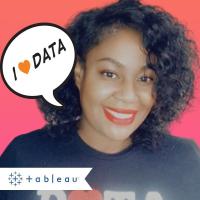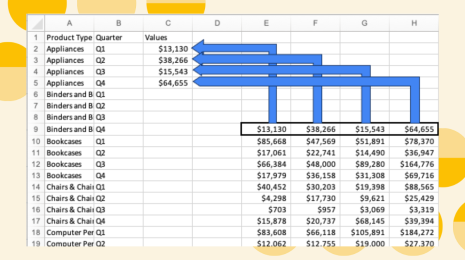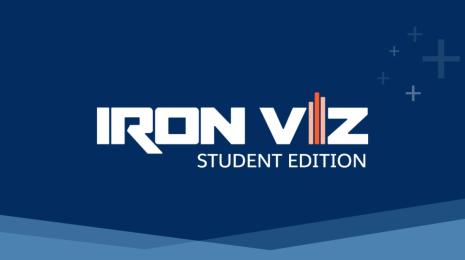Data and education for Social Justice: Olushola “Shola” Olojo

Olushola “Shola” Olojo
At Tableau, we feel that data skills are essential for the next generation of professionals and business leaders. The Tableau Academic Programs seek to arm students and instructors with the valuable analytical skills needed to think strategically and make an impact.
Data is such an important piece of the social justice puzzle, and using critical data skills can drive insights into real actionable change.
In our new series, Data and Education for Social Justice, we’re excited to spotlight people in the education community that are making a difference in the social justice world. These spotlights will highlight five main principles of social justice:
- Access to resources
- Equity
- Participation
- Diversity
- Human Rights
Our first spotlight is Data Scientist Olushola “Shola” Olojo living in Surrey, United Kingdom. Shola has a Bachelor’s of Business Administration Discipline in Economics from the University of Memphis.
Do you feel that data should be discussed in terms of Social Justice? Why?
A resounding YES! I once published a piece on Medium centered around the upsurge of the internet in recent years and how ubiquitous its use has become in our society.
When discussing the topic of Social Justice and how that is nested in our growing access to real-time information, I cannot help but recall the events surrounding the tragic death of George Floyd. Live video footage shared through various social media platforms sent shockwaves across America, galvanizing an entire social justice movement against police brutality. A call to action with pockets of communities springing up to address issues of disparity not only nested in race but also gender and class.
Moreover, technological advancements have made efforts of such communities, that may have previously been hidden in the shadows, quantifiable, and readily available for the public. This offers actionable insights on various digital platforms that drive decisions required to create lasting social reforms in marginalized communities.
Data and Social Justice are not mutually exclusive, and when utilized in unison produce an unparalleled force.
How do you see Academia supporting these efforts?
This is a tricky question because the growth of the internet has impacted people’s perception of traditional brick-and-mortar institutions. Even more apparent in a field like Data Science, where a four-year degree is often not required to break into the industry.
Further compounding this issue is the emergence of MOOCs (massive open online course) in recent years, making it increasingly difficult for universities/colleges to compete and offer credible, affordable courses that prepare individuals looking to make that leap into big data. Nonetheless, Academia can still serve an integral part in developing the next generation of “data handlers”.
As an undergraduate, I majored in Economics at The University of Memphis. You can only imagine my dismay when obligated to take courses like International Monetary Policy or Advanced Macroeconomics, reiterating principles and policies dating back decades. Sure, it was invaluable information but a complete snooze fest. In contrast, Urban Economics taught by Dr. Jamein Cunningham was an exploratory course that put me right in the mix of economic theories and societal issues by referencing real-world publications and their direct application to our immediate society.
One such example looked at Nashville’s recent economic boom and how that resulted in a detrimental decline in Memphis leading to mass outmigration, increase unemployment, and higher crime rates.
There it was!
More specifically, Academia can draw from this active teaching approach coupled with internships/study abroad opportunities (post-COVID-19) in an effort to support social justice. Granted, traveling abroad given the current climate doesn’t seem feasible but it would be interesting to observe how the use of data to tackle social issues differs from country to country
What can instructors do?
Curve the heck out of exams.
In all seriousness, I understand the importance of weekly assessments in ensuring that students understand the material, but this shouldn’t be a priority. I am a strong advocate of instructors exploring real-life datasets with their students in an attempt to upskill their technical stack and learn how to work with big data. My limited research on the Tableau Academic Program suggests it’s a wonderful initiative designed to facilitate this learning process.
Furthermore, instructors can use their platform as educators to connect with public figures in the Tableau community. There are some wonderful initiatives available in the Tableau circle.
Perhaps the most applicable to the theme of Social Justice would be “Diversity In Data” recently coined this year by Eve Thomas and Autumn Battani, which aims to bridge the disparity in all forms.
What can students do?
Be a student.
I’d encourage students to be more aggressive with their learning, taking control when possible. Paraphrasing the Red Queen from Alice in Wonderland, “In my kingdom, you need to run as fast as you can just to stay in the same place”. This fits perfectly with trying to crack into the data world. For starters, you are inundated with a ton of new information daily on what to actually learn. Is it Data Science, Machine Learning, or App Development? Confusion about your learning path is then further compounded by the constant technological innovation of software. It seems like everywhere you look there is a new platform popping up, designed to streamline the analytics process.
For students transitioning into this field, it can be a tad overwhelming and many get lost in the shuffle. Drawing from my own personal experience, I began by actively taking control of the information I absorbed as well as discarding what I considered irrelevant. More importantly, I adopted the mental paradigm shift of becoming a life-long learner and developed the ability to pivot at any moment. This has served me well thus far in surviving the noise and elevating myself as a Data person.
Whilst learning Tableau, I connected with Zen Masters and took detailed notes on how they manipulated certain datasets. I paid particularly close attention to not only what they did but their thought process behind how they went about devising solutions. With practice, I grew to devise my own unique way of creating compelling, insightful visualizations.
For students aspiring to break into the Data world albeit Social Justice, Sustainable Energy, or Media, I would suggest playing with real-world data, connecting with industry leaders, and aligning yourself with an active community.
Simply get stuck in. Don’t ask for advice, ask for feedback.
Data and social justice—where should people get started?
Check out the Tableau community-led projects
Also, dive into this data set by UNICEF: Gender Inequality in HIV Infections in Adolescents.
And lastly, what is a personal motto that you live by?
“Journey happily as opposed to arriving successfully” and “broken crayons still color”.
Connect with Shola
- Tableau Public
- Twitter: @tbigsho_
_________________
Since 2011, Tableau Academic programs have enabled more than 1.5 million students and teachers around the world with critical data skills. As data literacy increases in importance, learning analytics with Tableau will help students and educators make an impact in their communities. If you have a story for our Data and education for Social Justice series, reach out to us here.









